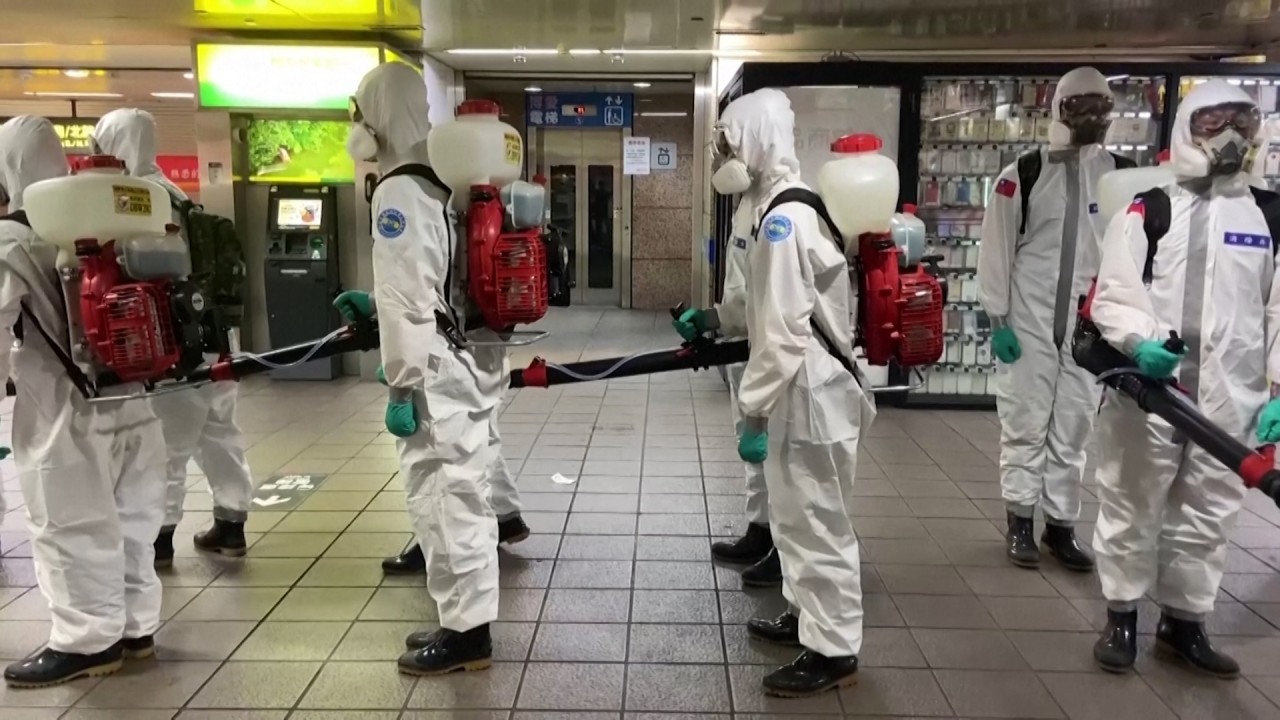
Coronavirus: Tsai’s approval rating slips as Taiwan reports around 500 cases for fourth day
- Spike in locally transmitted infections a key reason for the drop, according to pollster
- Survey finds that 65 per cent of respondents are worried the pandemic may cost them their jobs
Health authorities reported around 500 new cases for a fourth day on Tuesday and six deaths for a third straight day, prompting the island to extend level-three restrictions – the second highest – for two more weeks.
Meanwhile, Tsai’s approval rating slipped to 45.7 per cent in May, from 54.4 per cent in April, according to the latest poll conducted by the Taiwanese Public Opinion Foundation.

02:38
Taiwan deploys military to disinfect subway station after Covid-19 cases surge
“The recent spike in locally transmitted infections was one major reason for the drop in her approval rating,” foundation chairman Michael You Ying-lung told reporters on Tuesday.
Some 1,082 people across Taiwan were interviewed for the survey. It also found that 65.3 per cent of respondents were worried the pandemic could cost them their jobs, as opposed to 33.7 per cent who were not, and 84.5 per cent believed the virus was potentially life-threatening for them and their families.
The poll also delved into opinions on the origins of the pandemic, with 52.8 per cent saying they thought it was a man-made disaster, while 22.9 per cent thought it was not. Some 19 per cent believed it was both a man-made and natural disaster.
Taiwan’s coronavirus outbreak leaves services sector reeling as new curbs bite
After being hailed as a success story for containing the virus, Taiwan is experiencing its worst outbreak since the beginning of the pandemic. What started as a handful of cases on April 20 has quickly spread, with more than 3,500 locally transmitted infections recorded in the past 10 days.
Cases have now been reported in all areas of Taiwan except for the offshore islands of Penghu, Quemoy – also called Kinmen – and Matsu.
On Tuesday, health authorities reported 544 new infections – 281 new local cases, two new imported cases and 261 cases delayed by a reporting backlog last week – bringing the total number to 5,456, with 35 deaths, including the six latest deaths.
The Central Epidemic Command Centre has since Saturday reported additional cases that it said were not included in the past week’s count because its computer system had been overwhelmed.

Rapid testing centres have been set up in many cities, including Taipei and New Taipei, and Health Minister Chen Shih-chung on Tuesday said given that the positivity ratio remained high and there was concern about undiagnosed cases, “experts have strongly suggested that we extend the level-three alert to June 14”.
Chen urged people to follow the restrictions and stay home as much as possible to reduce the risk of being infected, but said there was no plan to impose a full lockdown at present.
“Due to the extension of the level-three alert, the Executive Yuan [Taiwan’s cabinet] will announce certain measures to help tide over local businesses,” he said, without elaborating.
Coronavirus: Taiwan appeals to US for vaccines amid fears for elderly
Chen said health workers would on Thursday begin administering some 410,000 doses of the AstraZeneca vaccine, recently delivered via the World Health Organization-backed Covax Facility. Health care and frontline workers would be given priority.
Taipei has signed deals for 5.05 million doses of the Moderna vaccine, 10 million of AstraZeneca, and 4.76 million doses of unspecified vaccines through Covax.
“Two million more doses will be shipped to Taiwan in June and another 10 million are expected at the end of August,” Chen said.
Chen and Premier Su Tseng-chang received AstraZeneca shots soon after the first shipment was delivered, but Tsai has yet to be vaccinated, saying she will wait for the locally made one.

